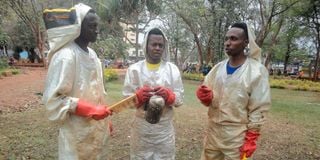Premium
What sting? Trio enjoy fruits of beesness

From left: Caesar Kimani, David Wambugu and Victor Kimani strategizing on how to harvest honey and collect bees from farms on the outskirts of Nairobi.
What you need to know:
- Caesar, David and Simon run a start-up that offers bee consultancy services to farmers in a business that is seeing them carve a niche for themselves in the market.
- One of their goals is to teach farmers to embrace modern beekeeping methods, in particular using efficient hives.
- Pollen, which is collected by bees can be harvested and used in the production of histamine, which helps prevent allergic reactions. It is also effective in reducing acne and prostate problems.
The journey from Nairobi to Kenol in Murang'a County is smooth and short, thanks to the Thika superhighway.
The Seeds of Gold team's destination is on Simon Ng'ang'a's crop farm, a few kilometres from Blooms shopping centre in Kabati.
Maize, bananas, sweet potatoes and mixed vegetables are flourishing on the farm, with beehives hanging strategically in different sections.
With Ng'ang'a on the farm is Victor Kimani, 24, who is taking him through various lessons on bee-keeping.
Kimani is also helping him check the status of the honey in the farmer’s four hives that are almost ready for harvesting.
Dressed in a bee suit, Kimani inspects each of the beehives before declaring, "two are ready for harvesting, the others are not".
He tells Ng'ang'a, "There is a good bee-keeping environment here, you should add more hives."
Kimani runs Beezy Adventures, together with partners David Wambugu and Caesar Kimani, through which they offer bee-keeping consultancy services.
On this day, while he was in Murang’a, his partners were on the other farms on the outskirts of Nairobi.
The trio opened the business early this year, with Kimani leading the group having worked for The Hive, a bee-keeping company.
Sh15,000 investment
“I trained my two friends on various aspects of bee-keeping that we saw it necessary to open our business, investing Sh15,000,” he says.
Among the services they offer are inspection and harvesting of honey, bee colony removal and transfer, apiary setup and design, hives installation, re-baiting of hives and feasibility studies to determine if the area is suitable for bee-keeping.
Kimani holds a diploma in business management from the Rift Valley Institute of Science and Technology, Wambugu a diploma in information technology while Caesar is a final year Bachelor’s in Applied Computing at KCA University.
“I work at the business part-time since I am a full-time student. I developed interest during the Covid-19 break, picked lessons from Kimani and now I go to the field on my own,” says Caesar.
One of the cases he attends to is when people seek to remove bee colonies from house ceilings, tree trunks and TV aerials.
“We discourage the killing of bees and so if a client wants to get rid of a colony in their compound, we get another one of our client’s hives and transfer the insects’ there.”
Kimani notes one of their goals is to teach farmers to embrace modern beekeeping methods, in particular using efficient hives.
"Many farmers still use traditional log hives that don't yield much and it's harder to harvest honey from them. One also harvests once a year," he says.
But there is the Kenya Top Bar Hive, which is almost a hexagon and has wooden bars for bees to build combs, explains Wambugu.
"These hives usually yield between 10kg and 18kg each. The hives can be harvested at least two to three times a year," he explains.
Another good hive, according to Kimani, is Langstroth hive, named after the inventor- Reverend Langstroth.
"This consists of two boxes – the brooding chamber and the super box chamber. One uses honey extractors during harvesting to protect the combs," he says, adding the hives yields at least three times a year 12-28kg per harvest.
While many farmers only harvest honey, Kimani notes there is also wax, used in the making bee attractants such as wax blocks as well as candles and body creams.
"It is usually sold in form of wax blocks whose retail price ranges from Sh700 to Sh1,000 per kilo."
Pollen use
Pollen, which is collected by bees can be harvested and used in the production of histamine, which helps prevent allergic reactions. It is also effective in reducing acne and prostate problems.
"Pollen is collected using special collectors and is sold at Sh10 per gram."
On the other hand, propolis can be used in treating the common cold and respiratory tract treatments.
Lastly, there is royal jelly produced by young worker bees and venom from the stings.
The latter is collected using a bee venom trap and is sold at between Sh6,000 and Sh8,000 per gram, making it the most expensive product in beekeeping.
In a month, the trio say they serve an average of 12 farmers.
“Since we started, we have served over 40 farmers. Some are now in our apiary management programme where we take care of their farms,” says Kimani, noting they charge Sh5,000 - Sh12,000 for bee colony removal and transfer, Sh400 for inspection and harvesting, apiary set up and installation services from Sh3,000 to Sh15,000 depending on the number of hives.
On the other hand, the consultancy and feasibility study costs Sh2,500 while the installation of honey processing equipment is Sh3,000.
They market their services on social media, serving farmers as far as Uasin Gishu, Nakuru, Kajiado, Trans Nzoia, Kitui, Garissa, Kiambu, Machakos, Meru, Makueni and Kisumu counties.
Felix Opinya, a livestock production specialist, notes that the bee business is a rewarding venture as it needs less capital to start.
He observes that one of the challenges farmers face is getting their hives colonised by a swarm of bees. Therefore, an expert who offers such services can be in high demand.





